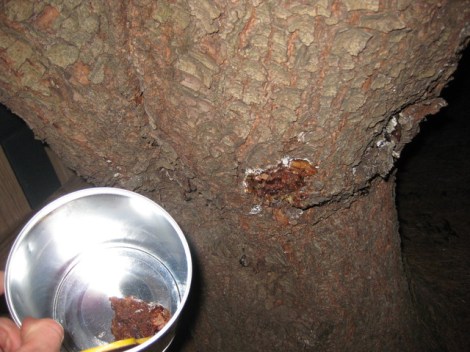
[Tom] needed more solder flux and instead of buying it he thought he’d try making his own. The thing is, he didn’t have any rosin on hand. But knowing its source let him acquire it for free. He took a sample of tree sap and turned it into his own solder flux.
We’ve seen a few different DIY flux recipes this year. The most recent guide suggests sourcing rosin from the hardware store because of the quality, or if that fails you’ll find some at the music store. [Tom] was lucky enough to find a large dollop leaking from a pine tree in his neighborhood. He let it sit overnight in a container along with some isopropyl alcohol. In the morning the sap had fully dissolved, so he ran it through a coffee filter to get rid of any debris. He keeps it in a small jar, applying it to his projects using cotton swabs. You can see his short soldering demo after the break.















my friend used resin directly form the pine, hot nail and a piece of lead from fishing kit to solder a mini jack connector so they can play a thrashy soundsysten in the woods ;)
Yea, I can solder after the apocalypse!
Lemon juice also works well,& it doesn’t smoke either!
not good, contains acid which will destroy the joints in the long run. Same might be true for the homebrew resin. Hard to tell what’s really in it…
Rosin and flux all contain acids!
I’ve been doing this in my very “early” years (~17 years ago). I lived in a VERY small town, there was no Internet, no E-Bay, no nothing (and no PC). Everything was hard to find, and everything was DIY.
BTW, a pill of Aspirin (or whatever is called in your country) also does the trick, it smokes & smells like hell but it works (and I’m still alive to tell about it, so it’s not lethal :D)
This isn’t new… The Keebler elves have been soldering like this for decades!
Done it, used it, and it works. If you want it preprocessed (more pure), buy it.
Wikipedia has quite good article about rosin, check it out.
“Rosin consists mainly of abietic acid, and combines with caustic alkalis to form salts (rosinates or pinates) that are known as rosin soaps”
In Wikipedia article about fluxes, in the rosin fluxes part there are the grades of activity.
“R, WW, and RMA grades are used for joints that can not be easily cleaned or where there is too high corrosion risk. More active grades require thorough cleaning of the residues.”
https://en.wikipedia.org/wiki/Rosin
“Rosin, also called colophony or Greek pitch (Pix græca), is a solid form of resin obtained from pines and some other plants, mostly conifers, produced by heating fresh liquid resin to vaporize the volatile liquid terpene components.”
It’s where it originates from.
just remember about ventilation girls!
Now all we need for survival after lead is a way to extrude the rosin inside reclaimed solder from old stuff.
Recycle!
Can one use Hexol? It’s 57.5% pine oils mixed with water, isopropyl alcohol and soap. It’s cheap and readily available.
rosin + turpentine = resin (sap)
Not sure if the turpentine really matters, would evaporate at soldering temperatures anyway…
Now THAT’s something I didn’t know :-)
i thought solder has the flux built in.
buy a roll of solder at radioshack or any electronics store and the flux is built into it.
i am talking about the 60/40 lead tin solder.
plumbing solder is not good for electronics since it has an acid for cleaning and bonding
I wouldn’t rely on flux-core solder.
Depending on your technique, any flux in your solder could already be evaporated away by the time the soldering is done.
It never hurts to add more flux. And, in my experience, it helps a lot.
Actually, plumbing solder is primarily not good for electronics because it’s a silver (hard) solder and has a much higher melting temperature. Acid flux is definitely not good for electronics, but not just because it’s an acid.
One could probably use butane extraction as well.
Funny, I did precisely the same last winter – dissolved in ethanol. Filtering was the hardest part, used a cotton-wool filled syringe.